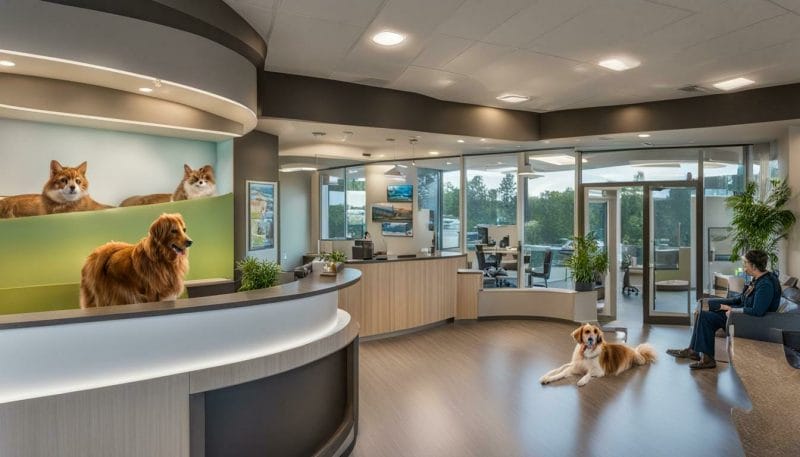Looking to boost your veterinary clinic’s online visibility? Loudachris offers top-notch SEO solutions tailored specifically for veterinarians in Australia. With our expertise in Veterinary SEO Services and Veterinarian SEO Strategies, we can help you enhance your Veterinary Marketing efforts and attract more customers to your practice.
When it comes to SEO, there are numerous strategies that can make a significant impact on your clinic’s visibility in search engine results. Here are the 7 ways Loudachris can assist you in optimising your veterinary clinic’s online presence and attracting more clients:
Key Takeaways:
- List your practice on Google My Business to improve your local SEO
- Leverage social media platforms like Facebook and LinkedIn to increase visibility and engagement
- Enhance your website with high-quality, relevant images to improve user experience and SEO optimisation
- Select focus keywords that accurately represent your services and optimise each page for better search rankings
- Create compelling meta titles and descriptions that include relevant keywords and encourage click-throughs
Implementing these strategies, along with regularly auditing your website for accuracy, speed, mobile responsiveness, and content relevance, can significantly improve your clinic’s online visibility and contribute to the growth of your business. Trust Loudachris, the leading SEO Company for Veterinarians, to help you achieve your goals.
The Importance of SEO for Veterinarians
In today’s digital age, having a strong online presence is crucial for veterinarians. SEO for veterinarians plays a vital role in improving their visibility and attracting more clients to their clinics. By implementing effective SEO strategies, veterinarians can ensure that their websites appear higher in search engine results, making it easier for pet owners to find them when searching for veterinary services.
One of the key benefits of SEO for veterinarians is that it helps target specific keywords and phrases that potential clients are likely to search for. By optimising their websites with these relevant keywords, veterinarians can increase their chances of appearing in search results when pet owners are looking for veterinary services in their local area.
Another important aspect of SEO for veterinarians is the role that it plays in improving user experience. Websites that are optimised for SEO tend to have faster load times, mobile responsiveness, and easy navigation. These factors contribute to a better user experience, which leads to higher engagement and increased chances of pet owners staying on the website and making an appointment at the clinic.
Furthermore, implementing effective SEO strategies can also help veterinarians build credibility and trust online. When a veterinary clinic appears at the top of search engine results, pet owners are more likely to perceive it as a reputable and trustworthy option. This can have a significant impact on their decision-making process when choosing a veterinary clinic for their beloved pets.
Overall, SEO for veterinarians is essential in today’s competitive digital landscape. By optimising their websites and online presence, veterinarians can improve their visibility, attract more clients, and ultimately grow their business.
Image: Veterinary Clinic

Google My Business for Local SEO
Listing your veterinary practice on Google My Business is a powerful way to enhance your local SEO, ensuring that your clinic appears prominently in local search results. When potential clients search for a veterinarian in your area, having a well-optimized Google My Business listing increases your chances of being visible and attracting new customers.

A Google My Business listing provides essential information about your clinic, such as your address, phone number, website, and business hours. It also allows clients to leave reviews and ratings, which can positively impact your online reputation. These reviews help potential customers make informed decisions, building trust and credibility for your veterinary practice.
Additionally, optimising your Google My Business listing with relevant keywords, a compelling description, and high-quality images can further improve your local SEO. Remember to update your listing regularly with any changes to ensure accurate and up-to-date information for clients.
Key Benefits of Google My Business for Local SEO:
- Increased visibility in local search results
- Improved online reputation through client reviews
- Enhanced credibility and trust for your veterinary practice
- Opportunity to showcase your clinic with high-quality images
- Easy access to essential clinic information for potential clients
By leveraging the power of Google My Business, veterinarians can effectively target local customers and strengthen their online presence. Don’t miss out on this valuable tool to boost your local SEO and attract more clients to your clinic.
| SEO for Veterinarians | Veterinary SEO Services | Veterinarian SEO Strategies | Veterinary Marketing | SEO Company for Veterinarians |
|---|---|---|---|---|
| Veterinary Website Optimisation | Organic SEO for Vets | Veterinary SEO Specialist | Veterinary Clinic SEO | SEO Tips for Veterinarians |
Leveraging Social Media for SEO
Social media platforms like Facebook and LinkedIn can significantly boost your clinic’s SEO by increasing its visibility, engaging with your audience, and attracting potential clients. These platforms offer unique opportunities to connect with pet owners, showcase your expertise, and promote your veterinary services.
One effective way to leverage social media for SEO is by regularly posting engaging and informative content related to pet health and care. By sharing valuable content, such as tips for keeping pets healthy or advice on common health issues, you can position yourself as a trusted authority in the field. This not only enhances your reputation but also increases the likelihood of your content being shared, improving your clinic’s visibility on search engines.
In addition to posting content, actively engaging with your audience through comments, likes, and shares can help boost your clinic’s SEO. Responding to inquiries and providing helpful advice demonstrates your dedication to customer service, which can attract potential clients who are searching for a reliable and caring veterinarian. Encourage pet owners to leave positive reviews on your social media pages, as this can also improve your search engine rankings.
“Social media is more than just a platform for sharing cute pet pictures. It’s a powerful tool that can significantly impact your clinic’s SEO, attracting more clients and helping your business thrive.” – Loudachris
When using social media for SEO, it’s important to optimise your posts with relevant keywords and hashtags. Research popular keywords related to veterinary services and incorporate them naturally into your posts. This will help search engines identify the relevance of your content and improve its visibility in search results.
Remember to include a link to your veterinary clinic’s website in your social media profiles and posts. This will drive traffic to your website, increasing its authority and improving your SEO. Additionally, sharing links to blog posts or informative articles on your website can help establish your clinic as a reliable source of information, further enhancing your SEO efforts.
| Benefits of Leveraging Social Media for SEO | How to Achieve These Benefits |
|---|---|
| Increased visibility on search engines | Regularly post engaging and informative content |
| Enhanced reputation and credibility | Engage with your audience through comments and shares |
| Improved search engine rankings | Optimize your posts with relevant keywords and hashtags |
| Increased website traffic | Include links to your clinic’s website in your social media profiles and posts |
By effectively leveraging social media platforms such as Facebook and LinkedIn, veterinarians can greatly improve their clinic’s SEO and attract more clients. It’s essential to regularly post engaging and informative content, engage with your audience, optimise your posts with relevant keywords, and include links to your clinic’s website. By implementing these strategies, your veterinary practice can gain visibility, establish credibility, and ultimately thrive in the digital landscape.

High-quality and relevant images on your veterinary clinic’s website not only enhance the user experience but also contribute to improved SEO optimisation. When potential clients visit your website, visually appealing images can immediately grab their attention and create a positive impression. These images can showcase your clinic’s facilities, staff, and adorable furry patients, helping to establish trust and credibility.
When incorporating images into your website, it’s important to optimise them for search engines as well. Compressing your images and using appropriate alt text can improve your website’s loading speed and make it more accessible to search engine crawlers. Additionally, alt text provides an opportunity to include keywords related to your clinic’s services, further boosting your SEO efforts.

Using relevant images throughout your website can also contribute to a better user experience. Images can break up text, making your website more visually appealing and easier to navigate. They can also help convey information quickly and effectively, allowing potential clients to understand your services at a glance. Remember to choose images that align with your clinic’s brand and resonate with your target audience.
In order to improve SEO optimisation with images, it’s important to optimise their file size and format. Large image files can slow down your website’s loading speed, negatively impacting user experience and search engine rankings. Compressing your images without losing quality ensures that your website remains fast and responsive, improving both user satisfaction and SEO performance.
Choosing and Optimising Focus Keywords
Selecting appropriate focus keywords for each page of your veterinary clinic’s website is essential in helping Google understand your services and increasing your chances of ranking higher in search results. By strategically incorporating relevant keywords throughout your content, you can optimise your website for search engines and attract more organic traffic.
To begin, conduct keyword research to identify terms that are commonly used by potential clients when searching for veterinary services. Tools like Google Keyword Planner or SEMrush can provide valuable insights into keyword popularity and competition. It’s important to choose keywords that are relevant to your clinic’s specialties and services, as well as those that align with your target audience’s search intent.
Once you have determined your focus keywords, strategically place them in key areas of your website. Start with the page title, making sure to include the focus keyword once. For example, if your clinic specialises in exotic pet care, your page title could be “Exotic Pet Care Services – ABC Veterinary Clinic.”
Next, incorporate your focus keyword into the page’s meta description. This is the short blurb that appears in search engine results, providing a summary of the page’s content. Including the focus keyword in the meta description helps search engines understand the relevance of your page to specific search queries. For example, a meta description for the above-mentioned page could be “ABC Veterinary Clinic offers expert exotic pet care services to ensure the health and well-being of your unique companions.”
Remember to also integrate your focus keywords naturally within the body of your content. Avoid overstuffing keywords, as this can negatively impact your search rankings. Instead, focus on creating high-quality, informative content that addresses the needs and concerns of your target audience. By providing valuable information and incorporating relevant keywords, you can improve your chances of ranking higher in search results and attracting more potential clients to your veterinary clinic.

| Benefits of Focus Keyword Optimisation | Guidelines for Choosing Focus Keywords |
|---|---|
|
|
“Choosing the right focus keywords for your veterinary clinic’s website is like selecting the right treatment plan for a patient. It requires careful consideration, research, and a holistic approach. By optimising your focus keywords, you’re giving your website the best chance to thrive in the competitive digital landscape.” – Dr. Emily Collins, Veterinarian
Crafting Effective Meta Titles and Descriptions
Crafting effective meta titles and descriptions is vital in capturing the attention of potential clients, improving your clinic’s SEO, and encouraging them to click through to your website. When potential clients search for veterinary services, the meta title and description are often the first glimpse they have of your clinic’s website. It’s your opportunity to make a strong impression and entice them to visit your site.
To optimise your meta titles, make sure they accurately describe the content of each page and include your focus keyword. For example, if you offer veterinary services in Sydney, your meta title for a page about dog vaccinations could be “Sydney Veterinary Clinic: Affordable Dog Vaccinations.” Including the focus keyword “dog vaccinations” helps Google understand the topic of the page and improves its chances of appearing in relevant search results.
Meta descriptions provide a summary of the page and should also include relevant keywords and a call to action. They give potential clients a preview of what they can expect if they click through to your website. For example, a meta description for the same dog vaccinations page could read, “Get affordable and professional dog vaccinations at our Sydney veterinary clinic. Book an appointment today and keep your furry friend healthy!” Including keywords like “affordable,” “professional,” and “book an appointment” helps capture the attention of potential clients and encourages them to take action.
Example Meta Title and Description:
| Meta Title: | Sydney Veterinary Clinic: Affordable Dog Vaccinations |
|---|---|
| Meta Description: | Get affordable and professional dog vaccinations at our Sydney veterinary clinic. Book an appointment today and keep your furry friend healthy! |
Remember, crafting effective meta titles and descriptions is just one piece of the SEO puzzle. It’s important to regularly review and optimise them to ensure they continue to align with your clinic’s services and target keywords. By paying attention to these details and implementing other SEO strategies, you can improve your online visibility, attract more clients, and ultimately grow your business.

Regular Website Audit for SEO Maintenance
Regularly auditing your veterinary clinic’s website ensures its accuracy, speed, mobile responsiveness, and content relevance, all of which are crucial for maintaining a strong SEO performance. An audit allows you to identify any issues that may be hindering your website’s visibility and ranking on search engines.
One important aspect to check during a website audit is accuracy. Make sure all the information on your website, such as contact details, business hours, and services offered, is up to date and consistent across all pages. Inaccurate information can confuse potential clients and negatively impact your local SEO.
Speed is another critical factor to assess. Slow-loading websites not only provide a poor user experience but also receive lower rankings from search engines. Use tools like Google’s PageSpeed Insights to identify areas where you can optimise your website’s loading speed.
| Website Audit Checklist |
|---|
| Check accuracy of contact information and business details |
| Optimize website loading speed |
| Ensure mobile responsiveness |
| Review content relevance and quality |
With the increasing use of smartphones and tablets, mobile responsiveness is essential for a successful website. Ensure that your website is designed to adapt and display correctly on different screen sizes. A mobile-friendly website not only improves the user experience but also boosts your search engine rankings.
Lastly, assess the relevance and quality of your website’s content. Ensure that your pages contain valuable information that is relevant to your veterinary services. Conduct keyword research to identify popular search terms related to your clinic, and incorporate them naturally into your content to improve your SEO performance.

Regularly auditing your veterinary clinic’s website and addressing any issues that arise will help you maintain a strong SEO performance. By ensuring accuracy, speed, mobile responsiveness, and content relevance, you can optimise your website for search engines and attract more potential clients to your clinic.
Conclusion
Implementing these seven SEO strategies can significantly enhance your veterinary clinic’s online visibility, attract more clients, and contribute to the growth of your business.
Firstly, submitting your practice’s information to Google My Business is crucial for improving your local SEO. This allows potential clients to easily find your clinic when searching for veterinary services in your area.
Secondly, leveraging social media platforms like Facebook and LinkedIn can greatly improve your clinic’s SEO. Maintaining a strong social media presence increases your visibility and engagement, ultimately driving more traffic to your website.
Thirdly, don’t underestimate the power of high-quality images on your website. Including relevant images can enhance the user experience and optimise your site for search engines. Compressing images and using alternative text further improve their SEO impact.
Fourthly, choosing and optimising focus keywords for each page of your website improves Google’s understanding of your services and increases your chances of ranking higher in search results.
Fifthly, crafting effective meta titles and descriptions is essential. Accurately describing the content of your pages, including relevant keywords, and incorporating a compelling call to action all contribute to engaging potential customers.
Sixthly, regular website audits are crucial for SEO maintenance. Auditing factors like accuracy, speed, mobile responsiveness, and content relevance ensures that your website is optimised for search engines and provides a seamless user experience.
By implementing these strategies, you can improve your online visibility, attract more clients, and contribute to the growth of your veterinary clinic.
Can the Same SEO Techniques be Applied to Both Veterinarians and Dietitians?
When it comes to SEO, both veterinarians and dietitians can benefit from the ways Loudachris can help. By optimizing website content, utilizing relevant keywords, and building quality backlinks, both professionals can improve their online visibility and attract more clients. Loudachris can offer tailored strategies to meet the specific needs of each profession.
FAQ
What is Loudachris?
Loudachris is a provider of SEO services specifically tailored for veterinarians. We specialise in helping veterinary clinics improve their online presence and attract more customers.
How can SEO help veterinarians?
SEO, or Search Engine Optimisation, is essential for veterinarians as it improves their online visibility and helps potential clients find their clinics more easily. By implementing effective SEO strategies, veterinarians can attract more customers and grow their business.
Why is Google My Business important for local SEO?
Google My Business is crucial for veterinarians as listing their practice on this platform helps improve their local SEO. It allows potential clients in the area to find the clinic easily and increases their chances of appearing in local search results.
How does social media impact a veterinary clinic’s SEO?
Having a strong social media presence, particularly on platforms like Facebook and LinkedIn, can significantly improve a veterinary clinic’s SEO. By increasing visibility and engagement through social media, clinics can improve their online presence and attract more customers.
How do high-quality images enhance SEO?
Including high-quality and relevant images on a veterinary clinic’s website enhances the user experience and improves SEO. Compressing images and using alternative text optimise them for search engines, making the website more attractive and visible to potential clients.
Why are focus keywords important for a veterinary website?
Choosing specific and relevant focus keywords for each page of a veterinary clinic’s website helps Google understand the services provided, improving the chances of ranking higher in search results. This increases visibility and attracts more potential customers.
How should meta titles and descriptions be optimised?
Meta titles should accurately describe the content of each page and include the focus keyword once. Meta descriptions provide a summary of the page and should include relevant keywords and a compelling call to action to engage potential customers.
Why is regular website auditing important for SEO maintenance?
Regularly auditing a veterinary clinic’s website ensures accuracy, speed, mobile responsiveness, and content relevance. These factors have a direct impact on SEO and need to be monitored and optimised to maintain a strong online presence.
Book Your FREE SEO Audit Today!

Chris Lourenco is the director of Loudachris Digital Marketing, an Adelaide-based SEO, Google Ads, and web design agency. Chris excels in crafting bespoke, results-driven strategies that help businesses get more traffic, leads and sales.


